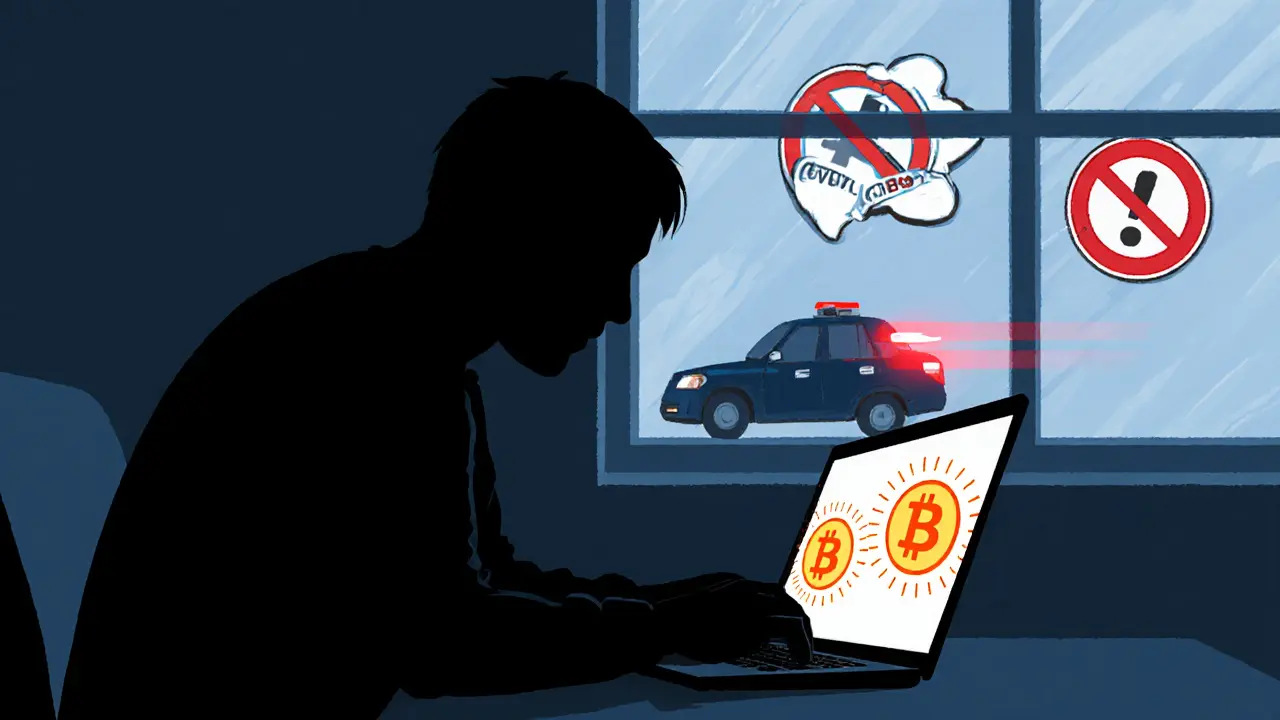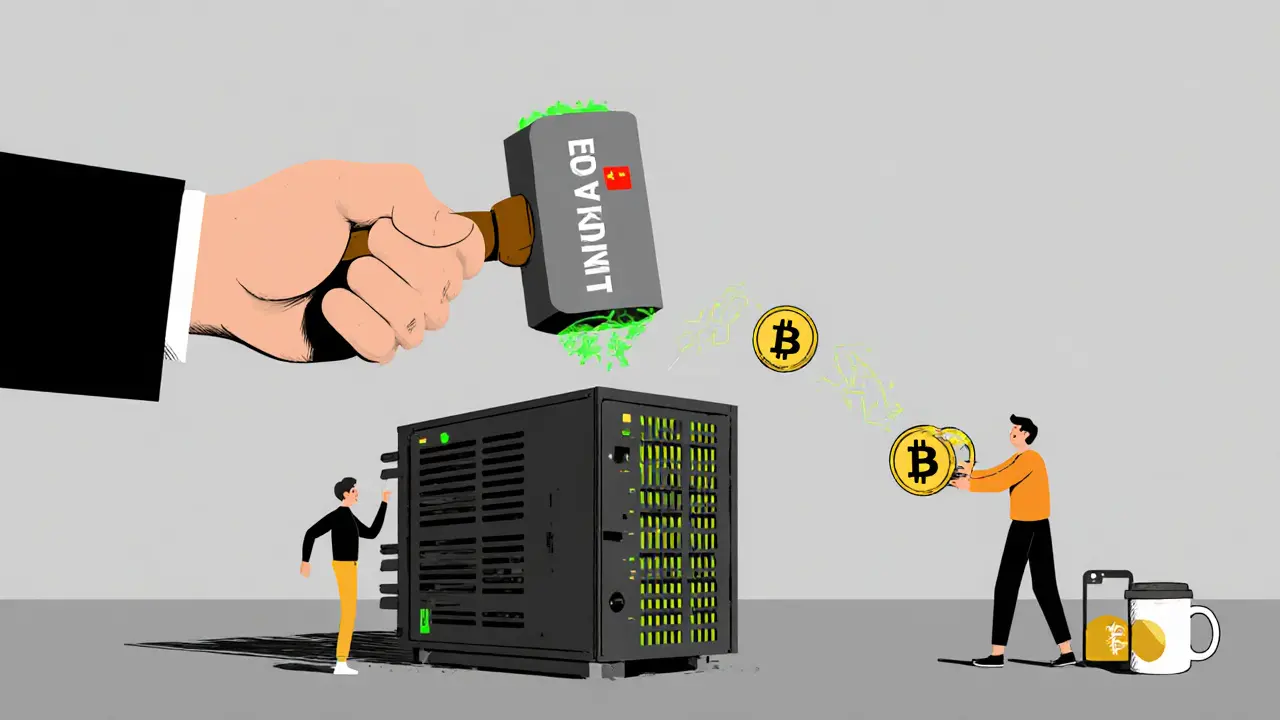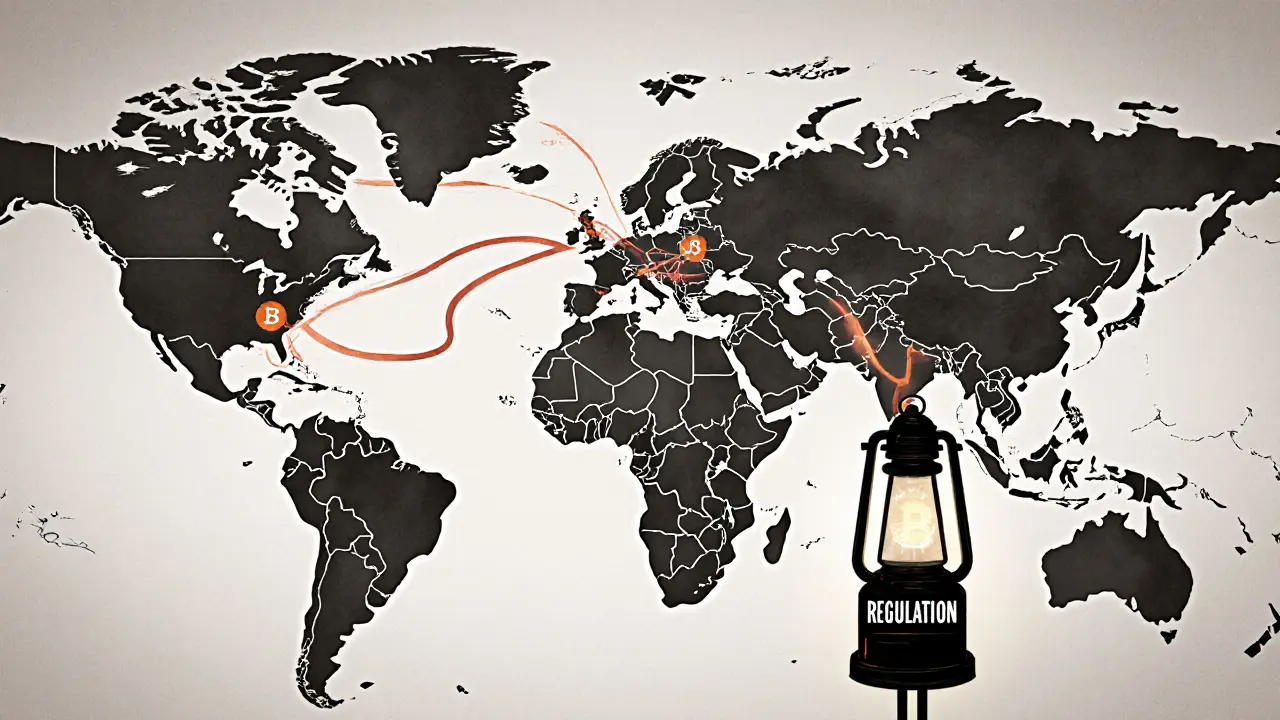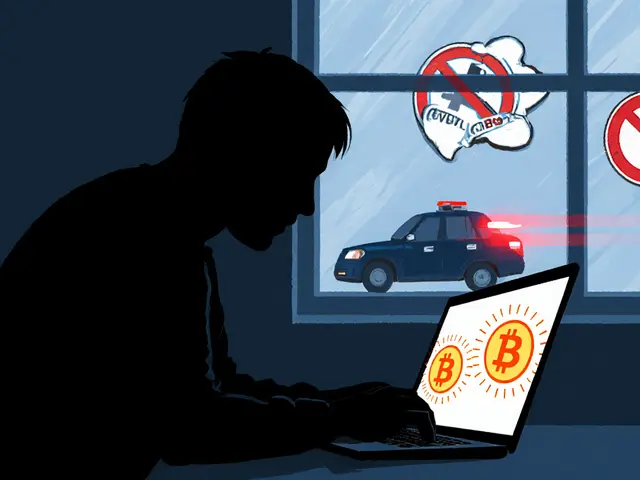Criminal Penalties for Crypto Ban Violations Worldwide: What You Need to Know

If you’re using cryptocurrency in a country where it’s banned, you might think you’re safe as long as you don’t get caught. But in some places, that’s not just a risk-it’s a crime that can land you in jail. While crypto is legal in most of the world, a handful of countries treat even holding Bitcoin as a criminal act. The penalties aren’t always clear, but the consequences can be severe.
Where Is Crypto Banned-and What Happens If You Get Caught?
As of 2025, only 10 countries have outright bans on cryptocurrency. That’s out of 75 nations tracked by the Atlantic Council. But those 10 include some of the most populous and restrictive economies on Earth. In Algeria, Morocco, Egypt, and China, owning, trading, or mining crypto is illegal. The laws are broad: Algeria’s 2017 decree bans the purchase, sale, use, and holding of virtual currencies. But here’s the catch-no one has published exact jail terms or fines. The law just says violators will be punished “in accordance with existing laws.” That vagueness is intentional. It gives authorities flexibility to respond however they want.
In Morocco, Bank Al-Maghrib declared Bitcoin a “financial asset,” not currency, and warned that using it violates foreign exchange rules. Penalties could come under the country’s financial code, which includes fines and possible imprisonment for currency violations. In Egypt, banks and financial institutions are forbidden from touching crypto. Individuals? The law doesn’t say. But in 2023, Egyptian authorities froze the accounts of 17 people who were reportedly using crypto to send money abroad. No arrests were made, but the message was clear: don’t push it.
China is the most extreme case. Since 2021, the government has shut down all crypto exchanges, banned mining operations, and blocked access to foreign platforms. But enforcement focuses on businesses-not individuals. Mining farms get shut down. Exchange operators get arrested. Regular users? They’re mostly ignored… unless they’re involved in large-scale transactions or sanctions evasion. Chainalysis estimates that in 2024, $28.7 billion in peer-to-peer crypto trades happened in China despite the ban. That’s more than the entire annual GDP of some African nations.
Why Do Countries Ban Crypto?
Most governments say they’re trying to stop money laundering, terrorist funding, and capital flight. The U.S. Treasury’s OFAC has targeted crypto addresses linked to Hamas, Hezbollah, and Russian sanctions evaders. In 2024, OFAC designated 86 crypto addresses tied to Russia-related entities. That’s not a ban-it’s a targeted strike. But countries like Algeria and Egypt don’t have the tech or resources to track wallets. So they ban everything.
China’s motive is different. It wants control over its financial system. The People’s Bank of China is pushing its own digital currency, the e-CNY. Allowing private crypto could undermine that. Russia’s stance is messy. It banned crypto payments but lets citizens hold it as property. After Western sanctions hit in 2022, Russian users flocked to crypto to move money out of the country. In response, the government cracked down on exchanges like NetEx24 and Bitpapa. In three months, inflows dropped 82%. But users just switched to peer-to-peer apps. The ban didn’t stop adoption-it just made it harder.
Who Gets Punished-and How?
There’s a big difference between punishing a business and punishing a person. In most banned countries, regulators go after exchanges, miners, and payment processors. Individuals rarely face jail time. A CoinDesk survey in May 2025 found that only 12% of crypto users in banned countries had ever faced legal consequences. Most got blocked by payment apps or had their accounts frozen. One Reddit user in Morocco said he used LocalBitcoins for 18 months without a problem. Another in Egypt said his bank blocked crypto-related transfers, but he never heard from police.
But there are exceptions. In 2024, a Gaza-based activist named Mustafa Ayash was sanctioned by the U.S. for raising crypto funds for Hamas after the October 7 attacks. That’s not a “crypto ban violation”-it’s a terrorism financing case. The penalties here are international, not local. He could face asset seizures, travel bans, and prison time in multiple countries. This shows how enforcement is shifting: governments aren’t going after ordinary users. They’re going after people who use crypto to fund violence or evade sanctions.
Even in countries with strict laws, enforcement is inconsistent. In Algeria, no one has been prosecuted under the 2017 crypto ban. In Egypt, authorities have raided homes looking for mining rigs but haven’t filed criminal charges against users. The laws exist more as warnings than tools for prosecution.

How Are Countries Changing Their Approach?
The global trend is moving away from blanket bans. The European Union’s MiCA law, which took effect in 2024, doesn’t ban crypto. It regulates it. Exchanges must get licenses. Wallet providers must verify users. But holding Bitcoin? Still legal. South Korea passed the Virtual Asset Users Protection Act in 2023, requiring exchanges to keep records and disclose risks. Again-no jail time for users.
The U.S. took a similar path. In April 2025, the Department of Justice issued new guidance: stop using criminal charges to settle regulatory disputes. They’re no longer prosecuting people just for using unlicensed exchanges. Instead, they focus on fraud, money laundering, and sanctions evasion. The GENIUS Act, signed in July 2025, treats stablecoins as payment instruments-not securities. That’s a big shift. It means the government is trying to manage crypto, not eliminate it.
Even China is softening. While mining is still illegal, the government has quietly allowed some blockchain tech companies to operate. They’re separating the technology from the currency. That’s smart. Blockchain can be useful for supply chains, land registries, and voting systems. Banning it all just hurts innovation.
What’s the Real Risk for Regular Users?
If you’re just buying Bitcoin to hold it, or sending crypto to a friend abroad, your risk is low-even in banned countries. The real danger comes from:
- Using centralized exchanges that are legally registered in your country (they’ll report you)
- Running a crypto business without a license
- Using crypto to move large sums of money across borders
- Getting involved in platforms linked to sanctioned groups
Most users never see a cop. But if you’re using crypto to avoid taxes, bypass sanctions, or launder money, you’re playing with fire. And in places like the U.S., Canada, and the EU, regulators are getting better at tracking those transactions. The days of anonymous, untraceable crypto are over.

What Should You Do If You Live in a Banned Country?
Here’s the practical truth: bans don’t stop crypto. They just make it riskier. If you’re in Algeria, Egypt, or Morocco, you can still use crypto-but you need to be smart:
- Use peer-to-peer platforms like LocalBitcoins or Paxful. No KYC, no bank link.
- Avoid large transactions. Keep amounts under $1,000 to reduce attention.
- Don’t use local exchanges. They’re monitored.
- Don’t mine crypto at home. It uses a lot of power-and draws attention.
- Don’t use crypto for illegal purposes. That’s when the law kicks in.
Remember: the goal isn’t to break the law. It’s to stay under the radar. Most governments don’t care about small-time users. They care about big players-exchanges, miners, and criminals.
Is a Global Crypto Ban Possible?
No. Not anymore. Even countries that banned crypto in 2017 are now realizing it doesn’t work. The Atlantic Council found that adoption rates in banned countries are just as high as in legal ones. People want access to money that’s not controlled by banks or governments. You can’t ban that with laws. You can only make it harder.
The future isn’t about bans. It’s about regulation. Countries that try to control crypto by punishing users will lose. Those that build legal frameworks-like the EU, Japan, and now the U.S.-will win. They’ll attract innovation, talent, and investment. And they’ll still stop the bad actors.
So if you’re worried about getting arrested for using crypto-chances are, you’re not going to be. But if you’re using it to break the law? Then you’re already on the radar. And that’s a different story.

Angie Martin-Schwarze
i just bought some btc last week n my bank flagged it 😭
Janna Preston
so if i hold bitcoin in egypt, am i technically a criminal? or just... a person who uses the internet?
Becca Robins
lol the gov thinks banning crypto will stop people from using it? bro i use it to send money to my fam in nigeria 😂
Meagan Wristen
i love how this post breaks it down so clearly. it’s not about banning tech-it’s about control. and people will always find ways to be free with their money. 💛
Noah Roelofsn
The real irony? Governments are terrified of decentralized finance because it removes their monopoly on trust. Central banks don’t want competition-they want compliance. But you can’t outlaw innovation. You can only delay it. And delay it badly.
Arjun Ullas
In India, we are not banned, yet the regulatory fog is thicker than monsoon humidity. The Reserve Bank of India has issued 17 warnings since 2018, yet crypto adoption has tripled. The state cannot suppress what the people need. This is not rebellion-it is evolution.
Ryan McCarthy
I’ve been using P2P for two years now. Never had a problem. The real criminals are the ones who use banks to launder money and call it ‘legitimate.’ Crypto just makes it harder to hide.
Steven Lam
why do people even care if you use crypto its not like its hurting anyone unless youre funding terrorists which like 0.001 percent of users are
Alexa Huffman
China’s approach is fascinating. They ban the currency but encourage the blockchain. That’s like banning newspapers but allowing ink and paper. Smart. The tech is neutral-it’s the use that matters.
Michelle Stockman
so you’re telling me the government is okay with people using crypto as long as they’re not rich enough to matter? classic.
Matthew Gonzalez
The ban isn’t about money. It’s about power. People who control money control the narrative. Crypto says: ‘You don’t get to decide what I value.’ And that terrifies them.
Vivian Efthimiopoulou
The philosophical underpinning of this issue is not legal-it is existential. The individual’s right to self-sovereign financial identity is being challenged by institutional inertia. To criminalize private monetary choice is to deny the fundamental autonomy of the human spirit. We are not merely transacting in digital assets; we are asserting our right to exist outside the state’s financial surveillance apparatus. This is not a crime. It is conscience.
Sierra Rustami
America bans crypto? No. America just taxes it into oblivion. And calls it ‘regulation.’
Fred Kärblane
Let’s not forget the infrastructure shift: P2P volume in China hit $28.7B in 2024. That’s not evasion-it’s market validation. The liquidity is there, the demand is real, and the regulatory arbitrage is accelerating. This isn’t a shadow economy-it’s the next-gen financial stack.
Tara R
People think they’re being clever using crypto but they’re just enabling chaos and undermining the financial system that keeps society from collapsing
Kyung-Ran Koh
I’ve lived in three countries where crypto was ‘illegal’-and every time, people found a way. The law is a wall. People are water. They don’t break it-they flow around it. 🌊
Glen Meyer
If you’re in a country that bans crypto, you’re probably already living under a dictatorship. So yeah, go ahead and get arrested. Maybe then the world will wake up.
Alexis Rivera
The most powerful thing about crypto isn’t the tech. It’s the quiet rebellion. A grandmother in Cairo sending money to her grandson in London without a bank. A student in Lagos paying for online courses with BTC. No permission. No gatekeepers. Just freedom. And that’s why bans will always fail.
Eric von Stackelberg
You think this is about money? Think again. The real goal is to track every transaction, every movement, every thought. Crypto is the last barrier against the digital panopticon. The bans? They’re not to stop crime. They’re to stop consciousness.
Emily Unter King
The MiCA framework is a watershed. It’s the first time a major jurisdiction treated crypto not as a threat, but as an asset class with fiduciary obligations. This is the beginning of institutional integration-not suppression. The regulatory arc bends toward legitimacy.
Michelle Sedita
I remember when people said the internet would destroy traditional media. Then newspapers went digital. Same thing here. The old systems aren’t disappearing-they’re adapting. Crypto isn’t the enemy. Fear is.